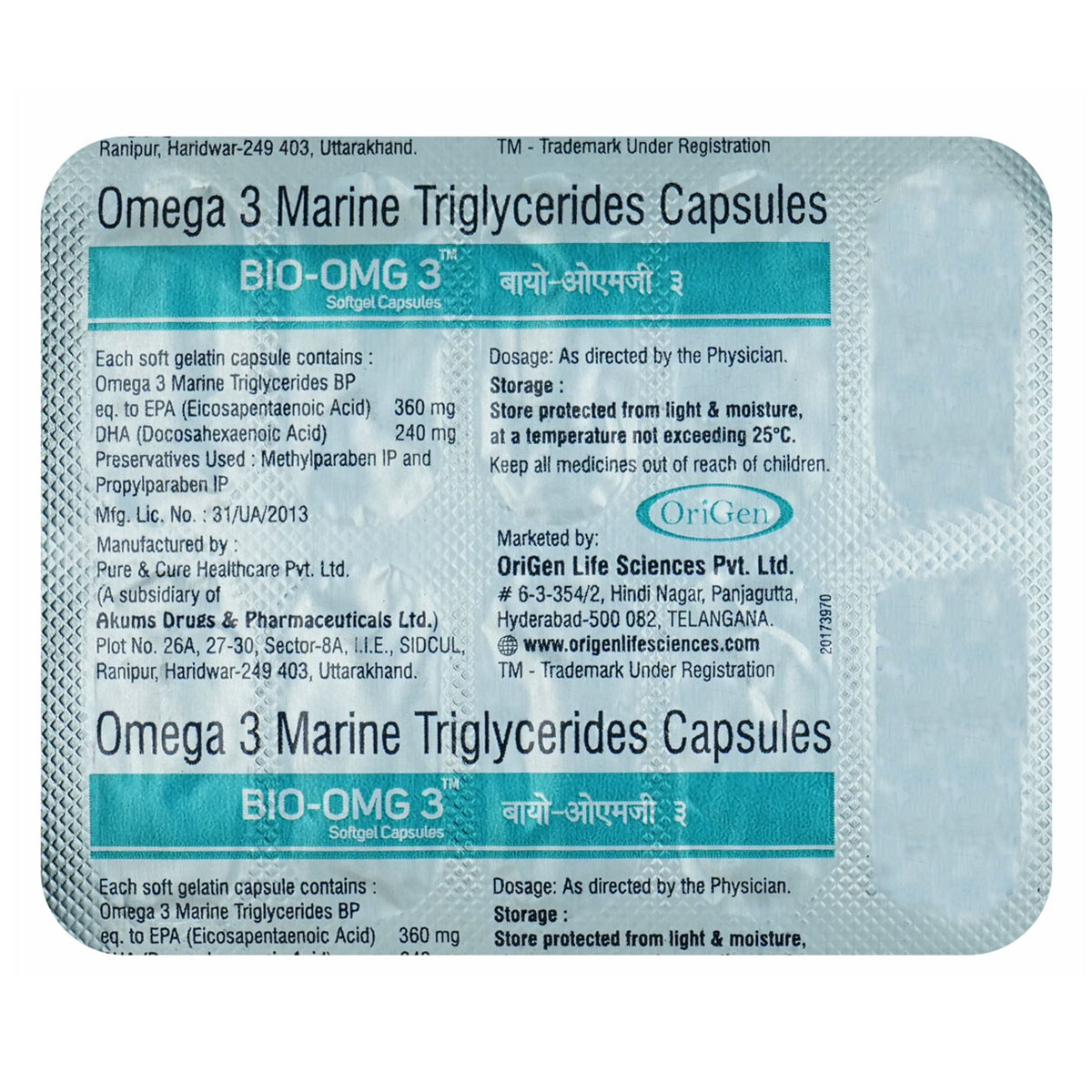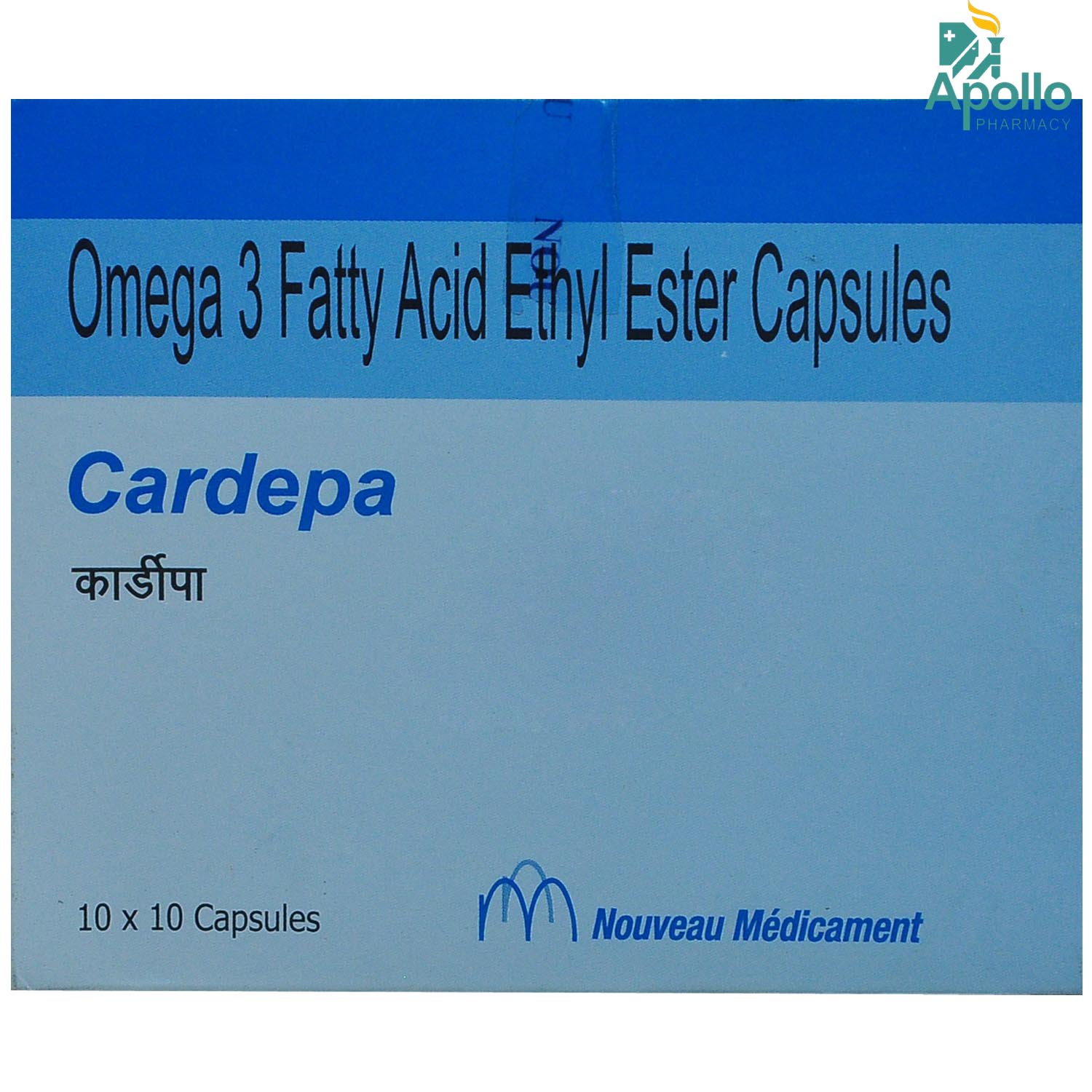Docosahexaenoic Acid+eicosapentaenoic Acid
About Docosahexaenoic Acid+eicosapentaenoic Acid
Docosahexaenoic Acid+eicosapentaenoic Acid belongs to a class of medications called ‘nutritional supplements used to treat nutritional deficiencies. It primarily treats, improves, controls, and prevents various complications or long-term diseases such as heart, brain, and spinal cord disorders, kidney, skin, respiratory, hormonal, cancer, and immune system problems.
Docosahexaenoic Acid+eicosapentaenoic Acid combines two medicines: Docosahexaenoic acid (DHA) and Eicosapentaenoic acid (EPA). DHA and EPA are omega-3 fatty acids. They can lower cholesterol levels, fight against inflammation, improve cognitive symptoms (memory, learning, and thinking abilities), improve mood and behaviour, and prevent blood clot formation. They can collectively help to treat and control various illnesses.
Docosahexaenoic Acid+eicosapentaenoic Acid is available in the form of capsules/tablets and infusion. You should take this medicine as prescribed by your doctor. The common side-effects of Docosahexaenoic Acid+eicosapentaenoic Acid are nausea (feeling sick), vomiting (being sick), abdominal distension, pain, constipation, diarrhoea, dyspepsia (indigestion), gas, belching, and heartburn. These side effects are usually temporary and don’t require medical attention. However, if any of these side effects persist or worsen, inform your doctor immediately.
Do not take Docosahexaenoic Acid+eicosapentaenoic Acid if you are allergic to any contents present in it or fish oils. Before taking Docosahexaenoic Acid+eicosapentaenoic Acid, inform your doctor if you have bleeding disorders, diabetes, hypotension (low blood pressure), aspirin sensitivity, arrhythmias (irregular heartbeat), undergone surgery recently, trauma recently, and liver or kidney diseases. Inform your doctor if you are taking blood pressure-lowering medications or blood thinners. Also, inform your doctor if you are pregnant or breastfeeding.
Uses of Docosahexaenoic Acid+eicosapentaenoic Acid
Medicinal Benefits
Docosahexaenoic Acid+eicosapentaenoic Acid combines two medicines: Docosahexaenoic acid (DHA) and Eicosapentaenoic acid (EPA). DHA and EPA are omega-3 fatty acids. They can reduce triglyceride levels and increase the body's high-density lipoprotein (good cholesterol) levels. This effect helps in reducing the risk of heart disease. They also have anticoagulant (decrease blood clotting) and anti-inflammatory (treat inflammation) properties. They also help improve cognitive symptoms (learning and thinking abilities), especially in patients with brain disorders. Together, Docosahexaenoic Acid+eicosapentaenoic Acid helps to fight against various neurological diseases, heart diseases, hormonal disorders, skin problems, respiratory illnesses and cancer.
Directions for Use
Storage
Side Effects of Docosahexaenoic Acid+eicosapentaenoic Acid
- Nausea (feeling sick)
- Vomiting (being sick)
- Abdominal distension
- Pain
- Constipation
- Diarrhoea
- Dyspepsia (indigestion)
- Gas
- Belching
- Heartburn
Drug Warnings
Docosahexaenoic Acid+eicosapentaenoic Acid might affect liver function. So, your doctor may perform blood tests while using Docosahexaenoic Acid+eicosapentaenoic Acid to evaluate liver function. Inform your doctor if you recently had surgery or trauma, as the Docosahexaenoic Acid+eicosapentaenoic Acid may increase bleeding risk. Do not take more than recommended doses (also consider dietary intake of DHA and EPA) as it might lead to a decrease in blood pressure, an increase in the risk of bleeding, and an increase in blood sugar levels.
Drug Interactions
Drug-Drug Interactions: Docosahexaenoic Acid+eicosapentaenoic Acid may interact with blood thinners (warfarin, clopidogrel, and aspirin) and slow down blood clotting. This medicine may also interact with medicines used to treat high blood pressure (captopril, enalapril, losartan, and valsartan, etc.).
Drug-Food Interactions: No interactions found.
Drug-Disease Interactions: Docosahexaenoic Acid+eicosapentaenoic Acid should be used with caution in patients with bleeding disorders, diabetes, hypotension (low blood pressure), aspirin sensitivity, arrhythmia (a condition associated with irregular heartbeat), and liver or kidney diseases.
Drug-Drug Interactions Checker List:
Safety Advice

Alcohol
cautionConsumption of alcohol may increase the risk of side-effects and worsen the condition.

Pregnancy
safe if prescribedDocosahexaenoic Acid+eicosapentaenoic Acid is possibly safe when taken in recommended amounts during pregnancy. However, the doctor may adjust your dose of Docosahexaenoic Acid+eicosapentaenoic Acid based on your dietary intake of EPA and DHA.

Breast Feeding
safe if prescribedDocosahexaenoic Acid+eicosapentaenoic Acid is possibly safe when taken in recommended amounts during breastfeeding. However, the doctor may adjust your dose of Docosahexaenoic Acid+eicosapentaenoic Acid based on your dietary intake of EPA and DHA.

Driving
safe if prescribedDocosahexaenoic Acid+eicosapentaenoic Acid may not affect your ability to drive.

Liver
cautionDocosahexaenoic Acid+eicosapentaenoic Acid might affect liver function. So, Docosahexaenoic Acid+eicosapentaenoic Acid should be used with caution in patients with liver diseases. The dose may have to be adjusted by your doctor.

Kidney
cautionDocosahexaenoic Acid+eicosapentaenoic Acid should be used with caution in patients with kidney diseases. The dose may have to be adjusted by your doctor.

Children
cautionDocosahexaenoic Acid+eicosapentaenoic Acid should be used with caution in children below 12 years. The dose may have to be adjusted by your doctor.
Habit Forming
Diet & Lifestyle Advise
- Prefer eating a meal that contains plenty of vegetables, fruits, and whole grains. Opt for non-fat dairy products and lean meats.
- Avoid greasy and processed foods. Avoid foods containing high sugars.
- Monitor your cholesterol levels regularly as advised by your doctor.
- Keep a check on your weight. Shed excess weight by exercising regularly.
- Do not take stress as it may show an effect on your eating habits.
- Quit smoking and limit alcohol intake.
Special Advise
- Docosahexaenoic Acid+eicosapentaenoic Acid should be used with caution in patients with known hypersensitivity to fish and/or shellfish.
- Monitor liver enzymes like ALT and AST levels periodically during therapy.
Patients Concern
Disease/Condition Glossary
Nutritional deficiencies: A nutritional deficiency occurs when the body does not absorb or get enough nutrients from food. Many nutrients are essential for a healthy life. Sometimes your body cannot absorb many nutrients even if you consume them. If left untreated, nutrient deficiency can lead to many health problems or worsen existing health problems such as a weakened immune system, skin problems, heart problems, kidney diseases, respiratory illnesses, or neurological diseases.
FAQs
Docosahexaenoic Acid+eicosapentaenoic Acid contains Docosahexaenoic acid (DHA) and Eicosapentaenoic acid (EPA). They are omega-3 fatty acids and act as nutritional supplements. They replenish the deficient nutrients essential for the normal functioning of the body.
Docosahexaenoic Acid+eicosapentaenoic Acid may affect blood glucose levels. So, it is advised to discuss with your doctor the possible risks associated with the use of Docosahexaenoic Acid+eicosapentaenoic Acid before taking it.
Docosahexaenoic Acid+eicosapentaenoic Acid may lower blood pressure, and using Docosahexaenoic Acid+eicosapentaenoic Acid in hypertensive patients (antihypertensive may also lower blood pressure) may lead to a severe decrease in blood pressure (hypotension), leading to dizziness and fainting. So, the Docosahexaenoic Acid+eicosapentaenoic Acid should be used with caution in patients taking antihypertensive medications.
Docosahexaenoic acid (DHA) and eicosapentaenoic acid (EPA) are omega-3 fatty acids that are abundantly found in fatty fish such as salmon, tuna, sardines, and mackerel. Eggs are also a good source of DHA. Nuts and seeds such as flax, chia, walnuts, and soy products are also rich in omega-3 fatty acids.
Docosahexaenoic Acid+eicosapentaenoic Acid may cause side effects such as nausea (feeling sick), vomiting (being sick), abdominal distension, pain, constipation, diarrhoea, dyspepsia (indigestion), gas, belching, and acid reflux. These side effects are usually mild and temporary. However, if any of these side effects persist or worsen, inform your doctor immediately.










